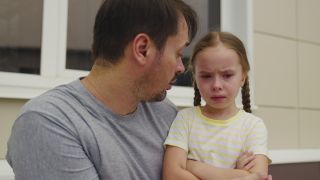Parental Alienation
Should Alienated Parents Apologize to Their Children?
When children are alienated, it’s not usually because of that parent’s actions.
Posted December 28, 2023 Reviewed by Michelle Quirk
Key points
- In parental alienation cases, the source of a child’s rejection of a parent is the other parent’s behavior.
- Alienation often comes from a child’s exposure to the other parent’s anger, sadness, disruption, and blame.
- Making an alienated parent apologize to the child for their own rejection is unhelpful and misplaced.
Parental alienation is a complex and confusing issue in many separated or divorced families. Its cause is primarily alienating behaviors by a favored parent who lacks emotional boundaries with the child and interferes with the child’s relationship with the rejected parent.1 The child absorbs the favored parent’s emotions and behavior and eventually develops strong fear and anger toward the rejected parent, with whom the child once usually had a good relationship. Of course, if the rejected parent has been abusive or has other extreme parenting deficits, then this is “realistic estrangement” and is not parental alienation.

Source of the Problem?
When parents have separated and a child absorbs their favored parent’s emotions, the child may grow to intensely dislike or hate the rejected parent. Yet, when asked for the reasons why the child never wants to see that parent again, they come up short. “I don’t like the way he wears his hair!” Or: “She’s no good at math!” Or: “She ruined my life by wanting to get divorced.” Or: “He showed up at my school and I didn’t want him there.” Or: “He criticized my mother for being late to pick me up.” None of these are the real reasons that the child is rejecting the parent, and they are certainly not reasons to permanently end a relationship with a parent.
What has usually happened is that the child has absorbed the favored parent’s emotions, because that parent lacks normal emotional boundaries. Their emotions are intense and repeated endlessly in the favored parent’s home with the child and may include intense anger, tears, and blame about the other parent. Researchers speak of “right brain to right brain” communication, which may explain how these emotions are transferred from parent to child without the child understanding any reason for the intense feelings that they have absorbed.2
In addition, brain researchers say that the left brain will make up reasons to fit the right brain’s emotions. “Perhaps the most important revelation in human split-brain research is precisely this: that the left cerebral hemisphere of humans is prone to fabricating verbal narratives that do not necessarily accord with the truth.”3 This is much like the way that children absorb their parent’s nonverbal feelings about race and gender when they are too young to understand and then try to make up reasons to fit the prejudice that they feel.
Professional Pressure to Apologize
Unfortunately, few family law professionals dealing with children who resist or refuse contact with a parent understand the emotional dynamics that may be occurring if it is an alienation case. Therefore, when a resistant child says, “I don’t like the way he wears his hair,” they tell the father to get a haircut without realizing that this has nothing to do with where the child’s resistance comes from—the other parent’s alienating emotions and behavior.
It is also not unusual to hear that a professional has told a parent to write a letter of apology to the child for coming to the child’s school uninvited or for having filed for divorce or for criticizing the other parent for being late for pick up. These expressed “reasons” have nothing to do with why the child is rejecting that parent. For the parent to write such a letter of apology reinforces the idea that it is the rejected parent’s fault that the child is rejecting him or her, rather than understanding the true source, and makes the alienation worse, not better. The apology "isn’t done right," or it’s never "enough." Then, the child is empowered by rejecting the apology and the professionals criticize the parent who “wouldn’t cooperate” or go far enough in their apology letter. I have seen this in several cases.
Some professionals view all cases of resistance and refusal as caused by both parents. Therefore, they seek to have both parents write letters of apology for their contributions to the resistance or refusal. But this is also rarely helpful because the intense rejection of a parent is usually because of either alienating behaviors by a favored parent or realistic estrangement by the rejected parent because of child abuse or domestic violence. It’s usually not both. (In fact, I have seen cases where an abusive parent also alienates the children against his victim, so it’s completely one-sided.) Making both parents apologize distorts what is truly going on and distracts from understanding the real situation.
What Can Be Done?
If everyone agrees (including both parents) that one parent is the primary cause of the child’s rejection, either through alienating behaviors or estrangement behaviors, then an apology would be OK from that parent. However, it is rare that both parents agree on the cause of the child’s rejection, and, often, the professionals don’t agree as well. Since the price of getting it wrong may be exposing the child to danger or ending a parent-child relationship for life, it is better to put energy into figuring out the behaviors that are a problem and focusing on behavior change for the future.
Apologies are about the past. What is needed in cases of child resistance to contact with a parent is improved behaviors. In contested cases, rather than focusing on the past and apologies, it’s far better to teach everyone (both parents) skills at managing their own behavior and managing conflicts. This way problems can be solved going forward rather than arguing over who to blame in the past. Until parents learn better self-management and co-parenting skills for the future, apologies about the past won’t make a difference. There is no harm done if both parents learn good skills going forward. This should be the focus of such cases, not endlessly fighting over who to blame and requiring them to apologize.
References
1. Demosthenes Lorandos and William Bernet, Parental Alienation: Science and Law, Charles C. Thomas, Publisher, 2020.
2. Allan Schore, Right Brain Psychotherapy, W.W. Norton & Company, 2019.
3. Antonio Damasio, The Feeling of What Happens: Body and Emotion in the Making of Consciousness, Harcourt Brace & Company, 1999, p. 187.


